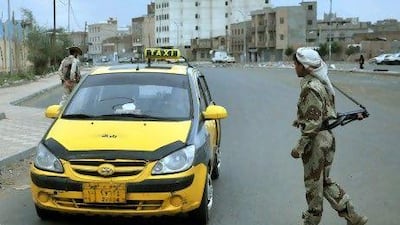SANAA // Yemeni activists and opposition leaders fear that simmering violence reminiscent of last year's "war in Sanaa" might derail the country's fragile transition to democracy.
Their concern was underscored by an attack on the interior ministry in the capital this week, which killed 15 people and injured 45.
A spokesman for the country's biggest political bloc said the latest fighting highlights the sensitivity of Yemen's transition after 33 years of Ali Abdullah Saleh's rule.
"This reminds us of last year's Sanaa war. People are armed and a criminal outbreak could take place at any given moment if politics fail," said Ahmed Al Bahri of the Joint Meeting Parties.
Media reports claimed the gunmen who stormed the ministry were backed by members of the central security services loyal to Mr Saleh, the former president who was forced to step down this year after an uprising against his regime.
Although Mr Saleh ceded power in February, his loyalists have sought to undermine the government of the transitional president Abdrabu Mansur Hadi, according to opposition parties.
"Ali Saleh will stand against any decree that leads to replacing his aides in the security sector. Though he is not president, he wants to remain Yemen's strongest man," said Yaseen Saeed Noman, the secretary general of the Socialist party.
Mr Hadi admits the road ahead will not be easy. Five months into his presidency, he is unable to move without a significant security presence.
"We are still passing through a critical phase and we hope to see light in the end of the tunnel. This cannot happen only through dialogue," said Mr Hadi last week.
Since taking power, Mr Hadi has removed corrupt officials from senior military and political positions but that has not been enough for activists who want to see change happen at a faster pace.
Hundreds of thousands of protesters continue to take to the streets on Fridays, where they call for further reforms and improved security. "We fought for freedom and democracy and don't see them yet. What we see today is the opposite and that is why we will continue protesting," said Khaled Al Anesi, a prominent activist in Sanaa.
No real progress has been made to accommodate all the political players in the National Dialogue process, a key element in the transitional period.
The first phase of the dialogue was initially planned for October but was delayed until November.
Last month, the International Crisis Group (ICG) released a report highlighting the dangers Yemen is facing.
The reports said that "if politicians in Sanaa fail to resolve, or at least contain, the ongoing elite confrontation and move forward with an inclusive dialogue, the country risks experiencing further violence and fragmentation".
"Yemen has long run away from critical decisions. It should run no more," it added.
Under the transitional plan that was brokered by the GCC, presidential elections are scheduled to take place in 2014.
In the interim, the government's main challenges are to advance the National Dialogue, restructure the army, and rework the constitution.
Mohammed Abulahoum, the president of the opposition Justice and Building party, believes that now is the time for Mr Hadi to prove his credentials.
"The president needs to standup to the challenge. People are waiting patiently for change but will soon give up on him," said Mr Abulahoum.
"Yemenis are still united behind him.".

